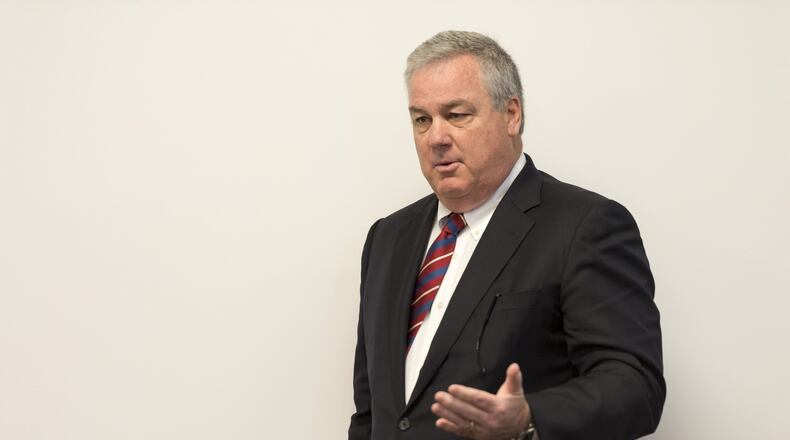After decades of turnaround schemes, lofty promises and dashed hopes, Underground Atlanta — the historic home of the city’s first streets and once one of Atlanta’s top destinations — is no longer the city’s problem.
That honor now belongs to WRS Real Estate Investment, a South Carolina developer of suburban shopping centers mostly anchored by Walmart stores.
The board of Invest Atlanta, the city’s economic development arm, agreed Thursday to sell the 12-acre downtown property for $34.6 million. WRS says it will spend $300-plus million to rejuvenate the ailing site, including the construction of apartments and a 40,000-square-foot grocery store.
The agreement comes after almost three bruising years of negotiations that included missed deadlines to get an agreement signed, contentious public meetings over selling city streets to forge a deal and a potential lawsuit by a downtown neighborhood association.
Residents of the area implored the board members Thursday to postpone the vote, saying the public deserved more input into a project many in attendance think will be a disaster. Among their concerns, they said, is a lack of transparency during the negotiations, and plans that will discourage public transit growth, decimate historic Kenny’s Alley and turn a city asset over to an unproven developer.
“The market shouldn’t have control over history,” said Johnny Martinez, co-owner of downtown’s Georgia Beer Garden. “We’re talking about getting rid of things that, once we get rid of them, we can never bring them back.”
A testy and visibly angry Mayor Kasim Reed shot back that the process was transparent, waving a sheet of paper in the air as he ticked off more than a dozen public meetings.
“What you all stood up here and said to me and this board is verifiably false,” Reed said. “I don’t care what times we are in today, you will not stand before us and lie.”
Scott Smith, CEO of WRS, said he expects the deal to close by the end of the month and work to start in the next 18 to 24 months. As part of the agreement, WRS would have to seek public comment before starting work that deviates from what is agreed upon in the original deal.
He also tried to quash a rumor that his company would build a big box Walmart on the site.
“Walmart will not be a part of this project,” he said. “Never at any time have we contacted Walmart about this project”
There was a lot at stake for both sides.
Residents agreed that Underground needs help, but favored a smaller- scale approach that encouraged use of public transportation, the construction of smaller grocery stores at different spots around downtown and saving more of the site’s historic buildings.
Some residents said they were disappointed with plans to add 2,000 parking spaces to accommodate the apartments and the proposed grocery store, a move the city said was necessary to close the deal. But residents said downtown development should focus on getting people out of cars and walking or riding bikes, not adding to Atlanta’s congested streets.
Last week, WRS agreed to a handful of restrictions meant to preserve parts of the attraction, including prohibiting modifications to historic buildings and ruling out opening a casino or adult entertainment establishment.
The developer also will continue to offer pedestrian travel and biking on streets on the property currently owned by the city and add an affordable housing plan to the development.
Reed sees the deal as an opportunity to set free an albatross that has been sitting around the city’s neck for decades. Selling Underground brings an end to years of failed attempts to transform the property into a sustainable retail and entertainment mecca.
Successive mayors, going back to Andrew Young, have sunk millions into updating Underground or hoped destination tenants such as Gap, Dante’s Down the Hatch and Victoria’s Secret would create enthusiasm, only to see an initial surge in attendance quickly disappear. Private-public development proposals, such as adding a casino to Underground, also eventually disappeared into the ether.
Thursday's approval came after the Atlanta Downtown Neighborhood Association dropped a challenge to the deal that could have scuttled the agreement. In January the group sent the city a demand letter questioning the legality of the deal, a prelude to a possible lawsuit.
But in a 5-4 decision on Tuesday, the group’s board settled with the city. The neighborhood’s attorney, Chris Collier of Decatur law firm Williams Teusink, said the city agreed to ensure public comment on the project, including informing residents of changes in The Atlanta Journal-Constitution and submitting plans to NPU-M and Invest Atlanta for review.
While the association settled their current dispute, they will remain heavily involved, Collier said.
“We’re not going away and our concerns are not going away,” he said.
A.J. Robinson, president of downtown development group Central Atlanta Progress, said he shares many of the concerns of area residents, but thinks it’s time for the city to cut its losses. He said he has watched the city try one idea after another to change Underground’s fortunes to no avail. The only investor willing to put serious skin in the game has been the city and that’s not sustainable.
“The market is going to dictate what’s happening,” he said. “We have a group that’s ready, that has spent three or four years working with everybody. I think we should give them a chance.”
About the Author
Keep Reading
The Latest
Featured


